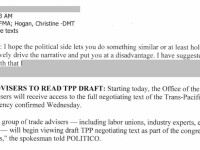Earlier this month, the British Columbia government unveiled a new $15 million music fund to support the local music industry. The fund matches a similar Ontario initiative that has doled out nearly $30 million over the past two years with a commitment from Premier Kathleen Wynne to make the Ontario Music Fund a permanent program to support the industry.
The millions of taxpayer dollars earmarked for the music industry represents a major success for the industry lobby, which shifted several years ago from focusing on digital copyright reform to identifying new sources of government financial support.
My weekly technology law column (Toronto Star version, homepage version) notes that despite the industry accolades, the Ontario program suffers from a surprising lack of transparency with virtually no public information on how the money is actually spent. Moreover, according to documents obtained under provincial access to information laws, the Liberal government has exaggerated the impact of the first round of funding with the creation of relatively few new full-time positions and limited international investment in the province.










